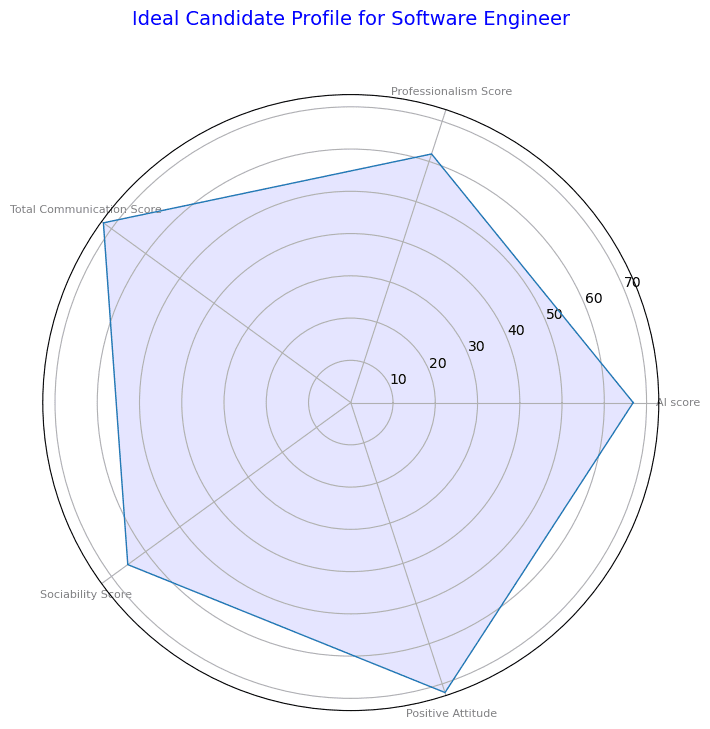Hiring a software engineer is a crucial process that requires a well-structured approach to identify the right candidate with the necessary skills, cultural fit, and potential to contribute to your organization’s success. Leveraging AI interviews can streamline the hiring process, ensuring you find the best candidate with the necessary skills and cultural fit.
This guide will help you define the role, outline the required skills, provide sample interview questions, and describe the ideal candidate profile. Here are some best practices to ensure a successful hiring process for a software engineer:
1. Define Clear Job Requirements
Detailed Job Description:
– Clearly outline the responsibilities, expectations, and scope of the role.
– Specify the technical skills, programming languages, and tools required.
– Highlight any preferred qualifications, such as experience with specific methodologies or industries.
Required Skills and Qualifications:
– List the essential technical skills, such as proficiency in certain programming languages, understanding of algorithms and data structures, and experience with development tools.
– Include desired soft skills like problem-solving, communication, and teamwork.
2. Use Strategic Sourcing Channels
Diverse Sourcing Channels:
– Post job listings on popular job boards, company website, and professional networks like LinkedIn.
– Attend and sponsor tech meetups, conferences, and hackathons to connect with potential candidates.
– Utilize specialized recruiting agencies for technical talent.
Employee Referrals:
– Encourage current employees to refer qualified candidates by offering referral bonuses.
– Leverage your employees’ networks to reach passive candidates who might not be actively job searching.
3. Screen Resumes and Portfolios Thoroughly
Resume Review:
– Look for relevant experience, educational background, and technical skills.
– Pay attention to project details, technologies used, and contributions made.
Portfolio Evaluation:
– Review coding samples, open-source contributions, or project portfolios on platforms like GitHub.
– Assess the quality, complexity, and relevance of the projects.
4. Conduct Comprehensive Interviews
Structured Interviews:
– Use a mix of technical and behavioral questions to evaluate both hard and soft skills.
– Include coding challenges, system design questions, and problem-solving exercises.
AI-Assisted Interviews:
– Use AI tools to conduct initial screenings, focusing on technical terminology and coding skills.
– Analyze the consistency and depth of responses, looking for candidates who demonstrate strong communication abilities.
Technical Assessments:
– Administer coding tests or technical assessments to evaluate candidates’ proficiency in required programming languages and technologies.
– Use platforms like HackerRank, Codility, or LeetCode for standardized assessments.
5. Evaluate Technical Knowledge and Problem-Solving Skills
Technical Questions:
– Ask questions that assess understanding of data structures, algorithms, system design, and relevant technologies.
– Include real-world scenarios that the candidate might encounter on the job.
Coding Challenges:
– Present coding challenges that test the candidate’s ability to write clean, efficient, and bug-free code.
– Assess their approach to problem-solving, debugging, and optimizing solutions.
6. Assess Cultural Fit and Soft Skills
Behavioral Questions:
– Ask questions that evaluate the candidate’s teamwork, communication, and adaptability.
– Explore past experiences and how they handled specific situations or challenges.
Team Collaboration:
– Involve team members in the interview process to assess how well the candidate fits with the team culture.
– Conduct pair programming sessions or group discussions to observe collaboration skills.
7. Offer Competitive Compensation and Benefits
Market Research:
– Conduct research to understand the competitive salary range for software engineers in your industry and region.
– Offer a compensation package that includes salary, benefits, and potential bonuses or incentives.
Career Growth Opportunities:
– Highlight opportunities for professional development and career advancement within your organization.
– Offer access to training programs, conferences, and industry events.
8. Provide a Comprehensive Onboarding Process
Orientation:
– Introduce the new hire to your company’s culture, values, and mission.
– Provide an overview of the projects, products, and teams they will be working with.
Training:
– Offer training on any specific tools, software, or development processes used by your organization.
– Provide access to resources and documentation that will help them get up to speed.
Mentorship:
– Pair the new hire with a mentor or a buddy to help them navigate their new role.
– Encourage regular check-ins to address any questions or concerns.
9. Foster Continuous Feedback and Improvement
Regular Reviews:
– Conduct regular performance reviews to provide feedback and set goals.
– Encourage open communication and ongoing development.
Professional Development:
– Support continuous learning by offering opportunities for skill enhancement and professional growth.
– Stay updated on industry trends and encourage the engineer to do the same.
By following these best practices, you can effectively hire a software engineer who meets your organization’s technical and cultural needs, ensuring they contribute to the success and growth of your team.
10. Sample Questions for AI Interviews
Technical Knowledge
– Question: Explain the difference between a stack and a queue. Can you give an example of when you would use each?
– Question: How does garbage collection work in Java?
Development Tools
– Question: Describe your experience with version control systems. How do you use Git in your workflow?
– Question: What is your approach to setting up a CI/CD pipeline?
Problem-Solving
– Question: Can you describe a challenging bug you encountered and how you resolved it?
– Question: How do you approach optimizing the performance of a slow-running application?
Collaboration
– Question: How do you handle disagreements with team members during a project?
– Question: Describe your experience working in an Agile environment.
11. Ideal Candidate Profile
The ideal candidate for a Software Engineer position will have:
– A degree in Computer Science, Software Engineering, or a related field.
– Proven experience in software development, demonstrated through a portfolio or GitHub profile.
– Proficiency in relevant programming languages and frameworks.
– Strong problem-solving and debugging skills.
– Experience with development tools and CI/CD pipelines.
– Ability to work effectively in an Agile environment.
– Excellent communication and collaboration skills.
– A proactive attitude towards learning and adopting new technologies.
Also read:
Introduction to the Series: The Hiring Guide Using AI Interviews
Hiring Guide Blog Series: How to hire an AI Engineer
Hiring Guide: How to hire a Data Scientist
Hiring Guide: How to hire a Technical Content Writer
Hiring Guide: How to hire a Software Engineer
Hiring Guide: How to hire a Technical Recruiter
By following this guide, you can effectively leverage AI interviews to hire a skilled software engineer who meets your organization’s technical and cultural needs.
Interviewer.AI is a technology platform purposely built to support Recruiters and HR teams in finding top talent for their companies. We also work with universities to help them with admissions and coaching, helping them use technology to solve for talent and training. Our mission is to make hiring equitable, explainable, and efficient. to screen in advance and shortlist the candidates that meet the criteria set.
Schedule a demo today to learn more about how AI interviews can help your hiring.
Gabrielle Martinsson is a Content Writer at Interviewer.AI. She’s a tech geek and loves optimizing business processes with the aid of tech tools. She also loves travelling and listening to music in her leisure.








